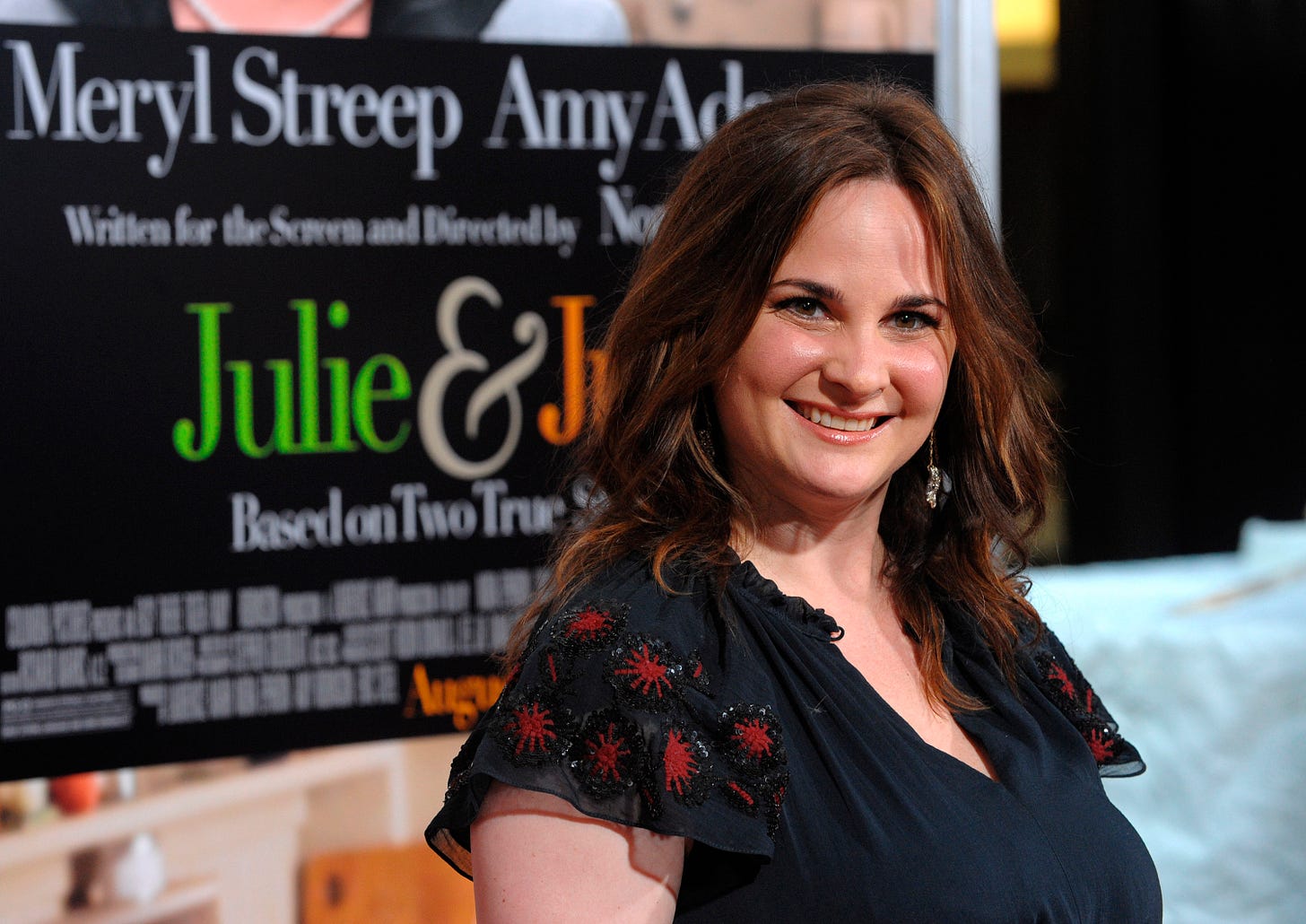Years ago, I first watched Julie & Julia and what I noticed most was just how optimistic it was about internet culture. It had that very turn-of-the-millennium rosy view of the online world, that it was this wonderfully liberating and opportunity-making development that would allow all sorts of people to connect with each other, to express themselves, and like real-life protagonist Julie Powell, make stars out of anyone who followed their passions.
The movie follows the dual narratives of Julie (Amy Adams) and Julia Child (Meryl Streep). Obviously, everyone knows who Julia Child is. Julie’s narrative is set in 2002 as she trudges on at her boring job at a call center. To keep things interesting, she starts a food blog in which she attempts to cook all the recipes in Julia Child’s cookbook, Mastering the Art of French Cooking. She quickly builds a big following, which gets the attention of the New York Times and eventually, gets her a book deal. From rags to riches. Or more aptly, from boredom to bestseller. It all seems like a modern day fairy tale, in retrospect.
With 2023 about to end, I’ve been thinking even more about what this year has meant to me as a writer. It’s marked my re-entry into internet writing, something I did a lot of from 2017 to 2020. Then, feeling as if I’d exhausted the type of writing I’d set out to do, I went underground, so to speak, and worked more on fiction. I also thought about what kind of non-fiction topics I’d want to write about next. Joining the surface-dwellers again has been rejuvenating.
I’ve also wondered if I should’ve started Substack earlier, especially since the fear and resentment over lost time has long been a central obsession of mine. I first heard of Substack around 2020 or 2021. If I were in my third or fourth year of writing here, where would I be? I’d probably have more of a foothold. Then again, I would’ve lost that much-needed underground time. I have a lot to be happy about with how Salieri Redemption has been going, but a lack of complacency is both a best and a worst quality of mine. In its best form, it manifests itself as ambition and adventurousness. In its worst, it shows up as ingratitude and restless climbing.
Knowing that about myself, it’s why I love the memoir Lost in the Meritocracy by
so much, because in it, he details his relentless striverism in trying to rise above his comfortable-but-modest roots in Minnesota to become a member of the elite culture class. After teacher’s-petting his way into early enrollment at Macalester, he transfers to Princeton to follow in the footsteps of F. Scott Fitzgerald, whose The Great Gatsby he admits he woefully misinterpreted. There, he immediately finds himself surrounded by not just the elite, but the culturally elite. His roommates include a “foppish piano prodigy with a mature, fine-bristled moustache, who dreamed of writing Broadway musical comedies and spent his leisure time in a robe and slippers, smoking Benson and Hedges Menthol 100s and hunching, vulturelike, over his black Steinway,” an heiress who parties with the Bee Gees, and a son of a prominent New York journalist. They never let him forget his lower social standing and when they order expensive furnishings that he cannot chip in for, they forbid him from sitting on the sofa, walking on the rug, and even glancing at their TV. Whit Stillman, you’re not too old to still make another movie, right?Eventually, Walt finds footing in his desired social tier among the avant-garde theatre kids, thanks to an older student named Nina who takes a liking to him: “Dating Nina raised my profile in serious campus drama circles and brought support for the staging of my play.” At this point, Walt is not even that interested in being a writer and only writes the occasional short nonsensical play because “[he] was a confused young opportunist trying to turn his confusion to his advantage by sucking up to scholars of confusion.” He only seems compelled to enter the writerly life by Holly, a beautiful rich girl who tells him:
“Truman said something interesting last night. We were drinking decaf at my station. I mentioned you. Your vocabulary. Your grades. I told him you might want to be a writer. He said, ‘Millie your precious little boy is either a writer or he isn’t.’ So I said, ‘How will he know if he’s a writer?’ And Truman, my little Martian, he shook his head, his dear little head, and said, ‘If he keeps on doing it.’”
And yes, that’s Truman Capote. As with Nina and her theatre crowd, Walt finds his way into Holly’s towering Manhattan apartment because a girl finds him attractive: “[Holly] liked making guys look androgynous, she said, but they had to have high cheekbones, and mine were gorgeous.” All of us outsiders are whores in the end, hoping the insiders find us fuckable. But if it’s our hotness that’ll get us through the door, it’s our bon mots that’ll keep us around for the parties.
In Sheena Patel’s I’m A Fan—which looks to be my new Loner in that it is the disturbingly honest contemporary novel that I’ll recommend to everyone I talk to (I wrote more about her novel here)— the protagonist bemoans her shortcomings as an artist:
I want to gain immortality because of my brain and not because of the potential of my womb. I cast about for much of my life looking for a way in, inside myself. The desire to be an artist is something that burns inside of me all of my life but I can’t get it out, I just don’t know how to make anything, my hands are not skilled, they are as useful as two clay lumps. . . . Perhaps I am just like everyone else and my disappointment is desiring to be special but not being special at all. Perhaps my life’s purpose is to square myself with this.
Fortunately for litnerds, we do know how to make something. Or at least we think we do. And that’s really half the battle, isn’t it?
So what is internet writing, if not crypto for us litnerds? It’s a dreamworld of supposedly no gatekeepers. Not expensive degrees. It’s a gold rush, or at least it once was, and we are all 49ers. A lot of people scorn crypto geeks, probably because many of them are quite annoying. But deep down, we like a bit of social rigidity and become unsettled when upstarts, especially ones that we think deserve their status, try to upend it. It confuses us and forces us to rethink our understanding of our society and our own place in it. But we sure do like such upheavals when we stand to benefit. We call it “social justice.”
But unlike crypto geeks, we don’t care too much about money, though it’d be nice. Instead, we’re more in need of acclaim, or worse, approval. Or worst of all, internet approval.
distinguishes between wanting fame and wanting recognition, and he’s right. You can be famous for curing cancer; you can also be famous for shitting yourself on the internet. But recognition is more like respect from people whom you respect as well. Recognition can be either widespread or small-scale. A lot of litnerds would say they’d prefer recognition to fame, including myself. But the distinction isn’t always so easy to make, is it? Especially since wanting recognition requires at least some knowledge of what we’re good at, and when the fame bug bites us at younger and younger ages, we have no idea who we really are. So we become like the narrator of I’m A Fan, in which we know we want to matter and be looked up to (or just looked at). And that’s it.There’s been recent firestorms about how much or how little Substack is getting Nazified. I’m sure there are some with genuine concerns about poisonous ideologies running too amok here. But I think for many, it’s instead really more about those want to replicate Tumblrized Twitter culture here vs. those who don’t. It’s Frasier and his dad Marty fighting about the old lounge chair. And it’s all because the primary litnerd arena, Twitter, has been on the decline for a while now. It was once where many litnerds could dream of making a name for themselves, maybe even a living. At the very least, we could feel like we were part of some cool in-crowd for the first time in our lives. But Twitter will soon become Facebook, and Twitter’s many would-be successors have all failed miserably in replicating what their daddy once was. So where are the litnerds to go if not Substack? Where else will we get our recognition or fame? TikTok? No, we’re petrified of video. There are some hot ones among us, but what we most value in ourselves is our written verbosity, not our aesthetics.
Tragically, the real-life Julie Powell passed away last year at only 49 years old. I never followed her closely as a writer, but still, learning about her untimely death did make me pause about the morbid symbolism: an internet writing success story dying alongside the endless parade of online publications that came up around the same time as she did. Rest in peace.
I have some writer friends who wonder if we’re all trying to thrive in a dying medium. They ask, half-seriously, whether we should’ve dedicated ourselves to another skill. But are litnerds made or born? At this point, does it matter? I know what I am and what other choice do I have but to continue on? At the very least, I’ve come to enjoy those solitary hours in which I write, which was not always the case when I was younger.
Bringing it back to our friend Truman Capote, if nothing else, I’ll entertain myself with the story of his Black and White Ball, which became the “party of the century.” I especially like the part where he let all those who’d once looked down on him lie about how they’d actually declined RSVPs, only to publicly release the full invitation list at the last minute to expose them as liars.
Maybe one day?
Happy new year.







Traditionally, one makes up for a lack of talent by attention-whoring.
This is especially prevalent in punk rock, which , contrary to its founding mythology, (like rock music in general) is NOT outsider music at all. More like music for narcissists. "Even though I can't sing or even play my instrument to a basic level of competence, I love myself so much that I am going to thrust myself in your face so that you can love me, too!"
What a great piece to end the year. The thought that are we trying to thrive in a dying medium reminded me of an old Mughal emperor's time. Aurangzeb took over the kingdom as the 6th ruler after assassinating his brother and imprisoning his father (the ruler of the Gloden period.) People remember him for these deeds while he also expanded the kingdom enormously.
He had 14 successors until the British took over but his reign was the last to have any impact. So, when I think of the writers of the current time it reminds me of Aurangzeb's reign. We are no longer in the former glory but we will still have many successors.
And it is hard to define if a ruler is born or made yet it is a fact that rulers rule. They have ruled even after the monarch system was changed with colonialism and then democracy. Similarly, I believe writers are going to continue writing no matter which direction the medium takes.
Happy New Year^^